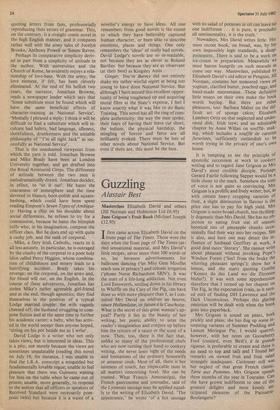Guzzling
Alastair Best
Ifirst came across Elizabeth David on the 1. front page of The Times. Those were the days when the front page of The Times car- ried sensational material, and Mrs David's little recipes, never more than 100 words or so, lay between advertisements for ballroom dancing ('let Miss Gem Mouflet teach you in privacy') and colonic irrigation ('phone Nurse Richardson SRN'). It was the start of a life-long addiction. Not even Lord Emsworth, settling down in his library to Whiffle on the Care of the Pig, can have done so with more pleasure than I, as I con- sulted Mrs David on endives au beurre, sauce Hollandaise, or faisan a la Cauchoise. What is the secret of this great woman's ap- peal? Partly it lies in the beauty of her writing; her poetic ability to seize the reader's imagination and conjure up before him the texture of a sauce or the scent of a stew. Then, too, there is the fact that, unlike so many of the professional chefs who are now turning their hand to cookery writing, she never loses sight of the needs and limitations of the ordinary housewife or amateur cook. Most of all, there is her sureness of touch, her impeccable taste in all matters concerning food. She can be trusted. What Francis Amunategui, the French gastronome and journalist, said of the Lyonnais sausage may be applied equal- ly to the writing of Elizabeth David. 'The appearance,' he wrote 'of a hot sausage
with its salad of potatoes in oil can leave no one indifferent ... it is pure, it precludes all sentimentality, it is the truth.'
Nowadays, Mrs David writes little. Her most recent book, on bread, was, by her own impossibly high standards, a disap- pointment. There is said to be a work on ice-cream in preparation. Meanwhile we must batten hungrily on such morsels as come our way. Masterclass, published by Elizabeth David's old editor at Penguin, Jill Norman, contains her measured views oil yoghurt, clarified butter, poached eggs, and hand-made mayonnaise. These definitive little essays on their own make the book worth buying. But there are other pleasures, too: Barbara Maher on the dif- ficult art of sponge cakes; Elizabeth Lambert Ortiz on that neglected and under- rated dish, Irish stew; and an admirable chapter by Anne Willan on souffle- mak- ing, which includes a souffle de carottes futuristes, sufficiently outlandish to be worth trying in the privacy of one's own home.
It is tempting to see the principle of apostolic succession at work in cookery writing and to regard Jane Grigson as Mrs David's most • credible disciple. Perhaps Gerard Fairlie following Sapper would be a little closer to the mark. Somehow the tone of voice is not quite so convincing. Mrs Grigson is a prolific and lively writer; but, as with certain heavy cropping varieties of fruit, a slight diminution in flavour is the price one has to pay for high yield. Mrs Grigson is more broad church, less thrilling- ly dogmatic than Mrs David. She has no ob- jection to eating fruit out of season; heretical tins of pineapple chunks occa- sionally find their way into her recipes. She is also, and here one may detect the in- fluence of husband Geoffrey at work,. a good deal more 'literary'. She cannot write about pheasant without invoking Pope's Windsor Forest (`See! from the brake the whirring pheasant springs'); show her a lemon, and she starts quoting Goethe ('Kennst du das Land wo die Zitronen bluhn?). It was with some apprehension therefore that I turned up her chapter on The Fig, in the expectation (vain, as it turn- ed out) of finding DH Lawrence and the Dark Unconscious. Perhaps this glaring omission will be dealt with when the book goes into paperback. Mrs Grigson is sound on pears, both prickly and plain; she has dug up some In- teresting variants of Summer Pudding and Lemon Meringue Pie. I would quarrel, however, with her notes on GooseberrY Fool (custard, even Bird's 41 la grande rigueur, is preferable to cream and there is no need to top and tail) and I found her remarks on stewed fruit and fruit salad strangely inadequate. Curiouser still was her neglect of that great French classic, Tarte aux Pommes. Mrs Grigson spends three months of the year in Touraine. Can she have grown indifferent to one of the greatest delights and most keenly an- ticipated pleasures of the Patisserie- Boulangerie?






































 Previous page
Previous page